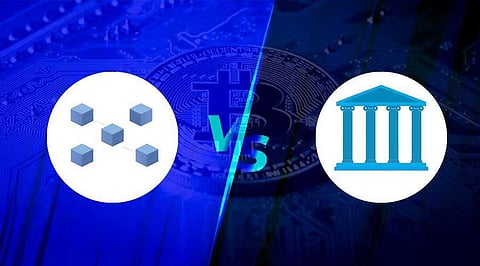
- Insights
- Cryptocurrencies
- Stocks
- White Papers
- Industry
- Geography
- Insights
- Cryptocurrencies
- Stocks
- White Papers
- Industry
- Geography


Centralized Finance: CeFi is a type of finance in which a single body or institution is in charge of overseeing and governing the financial system's activities. This entity is often a bank, government, or other significant financial institution that establishes the system's rules and regulations.
Pros of CeFi
Speed: Because all activities are performed in a single, centralized place, Centralized Finance systems are typically quicker and more efficient than DeFi systems.
Familiarity: CeFi systems are more familiar to users since they are built on established banking systems and processes that have been in place for many years.
Accountability: Because CeFi systems are overseen by a central body, they are subject to greater levels of responsibility.
Cons of CeFi
Limited Access: Because there is no central authority involved, DeFi systems are more accessible. This implies that everyone, regardless of geography or financial resources, may use the system.
Censorship: Because the central authority has the right to manage and restrict access to specific products or services, CeFi systems may be vulnerable to censorship.
Single Point of Failure: Because all activities are performed by a single person, CeFi systems are subject to a single point of failure. If this entity fails, the entire system may become inoperable.
Decentralized Finance: DeFi is a type of finance in which no one body is in charge of overseeing and governing the financial system's functioning. Instead, it relies on blockchain technology, freely available software, smart contracts, and peer-to-peer networks to perform its duties.
Pros of DeFi
Accessibility: Because there is no central authority involved, Decentralized Finance systems are more accessible. This implies that everyone, regardless of geography or financial resources, may use the system.
Transparency: Because all activities are carried out on a public, open-source blockchain, DeFi systems are more transparent.
Permissionless: This ensures that everyone has equal access to the system and can monitor the blockchain's activity.
Cons of CeFi
Complexity: For people who are new to blockchain technology, DeFi systems might be complicated to comprehend. This may restrict the number of people who may access the system.
Volatility: DeFi systems are particularly volatile since the market value of digital assets fluctuates rapidly. This can raise risk and make investing in DeFi a dangerous venture.
Lack of Regulation: DeFi systems are mostly unregulated, which can put investors at risk. Because there is no centralized authority to supervise the system, this might lead to fraud and other unwanted acts.
